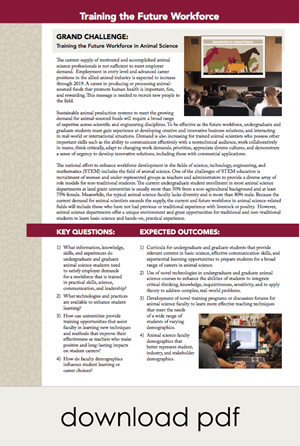Training the Future Workforce
Grand Challenge: Training the future workforce in animal science
 The current supply of motivated and accomplished animal science professionals is not sufficient to meet employer demand. Employment in entry level and advanced career positions in the allied animal industry is expected to increase through 2019. A career in producing or processing animal- sourced foods that promote human health is important, fun, and rewarding. This message is needed to recruit new people to the field.
The current supply of motivated and accomplished animal science professionals is not sufficient to meet employer demand. Employment in entry level and advanced career positions in the allied animal industry is expected to increase through 2019. A career in producing or processing animal- sourced foods that promote human health is important, fun, and rewarding. This message is needed to recruit new people to the field.
Sustainable animal production systems to meet the growing demand for animal-sourced foods will require a broad range of expertise across scientific and engineering disciplines. To be effective as the future workforce, undergraduate and graduate students must gain experience at developing creative and innovative business solutions, and interacting in real-world or international situations. Demand is also increasing for trained animal scientists who possess other important skills such as the ability to communicate effectively with a nontechnical audience, work collaboratively in teams, think critically, adapt to changing work demands, prioritize, appreciate diverse cultures, and demonstrate a sense of urgency to develop innovative solutions, including those with commercial applications.
The national effort to enhance workforce development in the fields of science, technology, engineering, and mathematics (STEM) includes the field of animal science. One of the challenges of STEM education is recruitment of women and under-represented groups as teachers and administrators to provide a diverse array of role models for non-traditional students. The current undergraduate student enrollment in most animal science departments at land grant universities is usually more than 50% from a non-agricultural background and at least 75% female. Meanwhile, the typical animal science faculty lacks diversity and is more than 80% male. Because the current demand for animal scientists exceeds the supply, the current and future workforce in animal science-related fields will include those who have not had previous or traditional experience with livestock or poultry. However, animal science departments offer a unique environment and great opportunities for traditional and non-traditional students to learn basic science and hands-on, practical experience.
Key Questions:
- What information, knowledge, skills, and experiences do undergraduate and graduate animal science students need to satisfy employer demands for a workforce that is trained in practical skills, science, communication, and leadership?
- What technologies and practices are available to enhance student learning?
- How can universities provide training opportunities that assist faculty in learning new techniques and methods that improve their effectiveness as teachers who make positive and long-lasting impacts on student careers?
- How do faculty demographics influence student learning or career choices?
Expected Outcomes:
- Curricula for undergraduate and graduate students that provide relevant content in basic science, effective communication skills, and experiential learning opportunities to prepare students for a broad range of careers in animal science.
- Use of novel technologies in undergraduate and graduate animal science courses to enhance the abilities of students to integrate critical thinking, knowledge, inquisitiveness, sensitivity, and to apply theory to address complex, real-world problems.
- Development of novel training programs or discussion forums for animal science faculty to learn more effective teaching techniques that meet the needs of a wide range of students of varying demographics.
- Animal science faculty demographics that better represent student, industry, and stakeholder demographics.
Download the Grand Challenges Documents
Read each section:
Introduction
Animal Health
Agricultural Animals and Climate Change
Food Safety
Global Food Security
Animal Well-Being




